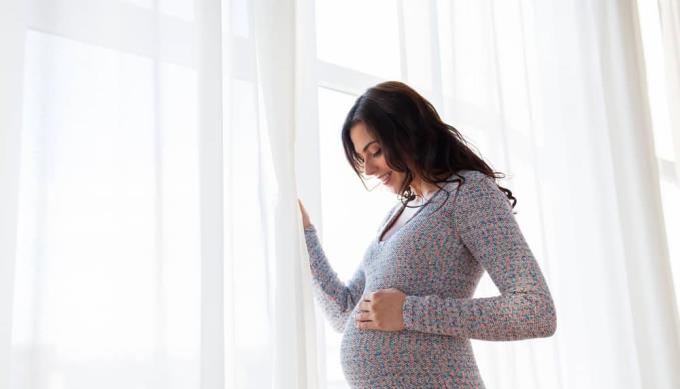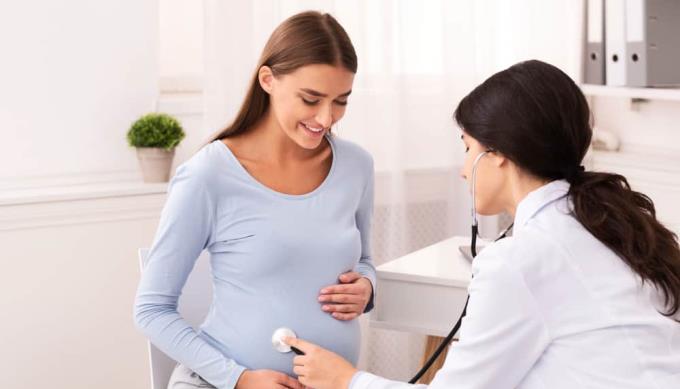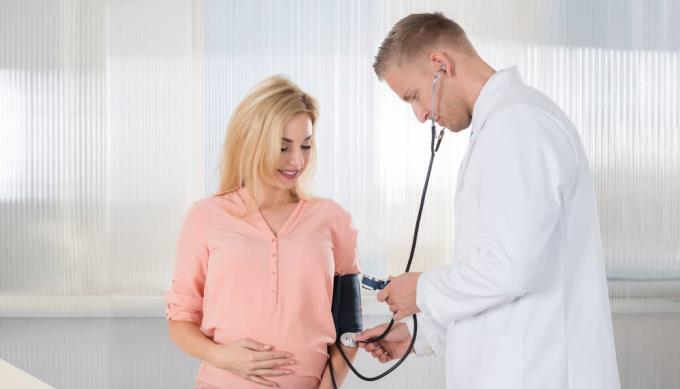Usually, lower abdominal pain during pregnancy starts towards the end of the second trimester and feels like menstrual cramps. However, some pregnant women experience lower abdominal pain as early as 12 weeks of pregnancy or earlier.
From pregnancy until the baby is born, the mother's belly undergoes many changes. The growing uterus over the course of 9 months pushes your abdomen to change to suit the development of the fetus.
Every pregnancy is a different experience, so sometimes the cause of the heavy feeling is different. Usually, there are a few reasons why you experience lower abdominal pain during pregnancy other than the contraction of your abdominal muscles. The following article of aFamilyToday Health will list the causes of this phenomenon.
Cause pregnant women have abdominal pain during pregnancy
Many people wonder why pregnant women suffer from abdominal pain? That answer can be due to the following 9 main reasons:
1. The premature placenta causes pain in the lower abdomen during pregnancy
During pregnancy, your uterus grows with the placenta. The placenta is an important organ for the survival of the fetus because it provides the nutrients and food necessary for the baby to grow.
In rare cases, the placenta will detach from the uterine wall. When this happens, the uterus becomes tight and painful. If the pain persists and does not go away, see your doctor right away.
Usually, the placenta comes off the uterine wall after you give birth. Therefore, the earlier peel off will have a serious effect on the baby. At the same time, research shows premature placenta can cause serious complications like perinatal death. Fortunately, this phenomenon occurs only in about 1.5% of all pregnancies in the world.
2. Constipation and bloating make pregnant women suffer from abdominal pain

When you are pregnant, you often have the mentality of eating for two. But in fact this is very wrong. During pregnancy, you only need to eat yourself with a diet rich in nutrients, fats and essential minerals. That will ensure the development of the fetus .
In most cases, a healthy diet usually cannot help a pregnant woman prevent constipation. Because constipation is just one of many causes of lower abdominal pain during pregnancy.
The reason is not entirely dependent on the diet, but also because of the constant pressure of the uterus against the wall of your intestines. In addition, the level of progesterone in your body increases, reducing bowel movements (low progesterone levels will also adversely affect the fetus). This inadvertently causes food to pass through the digestive tract often more slowly. All of these factors make your lower abdomen feel pain and discomfort.
Therefore, a diet high in fiber and drinking enough fluids and light exercise will help prevent constipation during pregnancy . If you want to resolve this more quickly, you can ask your doctor if you can take a stool softener or you can try some bowel methods, such as a colon massage.
3. The body accumulates fat during pregnancy
Weight gain during pregnancy not only changes your body shape, but also makes you feel tight in your abdomen. During the first and second trimesters , your body will show signs of fat accumulation, starting in your abdomen and then your thighs.
As your belly gets bigger, your fat cells also need to adapt to the development of the uterus. Therefore, the lower abdominal pain may be due to fat accumulation occurring earlier in pregnancy or during the second trimester in some women. At this point, you should feel like your menstrual cramps.
4. The unborn baby kicks in can cause the mother to have abdominal pain during pregnancy

During pregnancy, your belly is like a baby's float. Entering your second trimester, you should be able to feel your baby's kicks in your belly. These are signs that your baby is growing well. As your baby becomes too active, your tummy will be under more pressure. Every time your baby kicks a kick, the wall of your abdomen will become tense in response to this stimulus. Although this is just the body's adaptive response to the fetus, this also makes pregnant mothers uncomfortable.
You may not feel the pain when you have a period, but you may feel the bloating or tightness you feel after you eat a full meal. This usually doesn't last long and you will forget about it.
5. Excessive stretching of the abdomen during pregnancy
As the due date approaches , your body will feel more restless and tired. You may feel body aches.
Back pain is a common symptom of pregnancy because your back has to support the fetus. This can also cause pain in your lower abdomen. Pain in the abdomen and thighs is also common because these muscles, which connect with the tissue around the groin and uterus, can be overly stretched to accommodate the development of the fetus.
The best way to relieve pain is to rest more when you're tired. You can also use a hot compress or massage your body, get enough rest when you feel unwell.
6. Urinary tract infection (UTI) makes pregnant women suffer from abdominal pain during pregnancy

About 10% of pregnant mothers are at risk for a urinary tract infection (UTI) at some point in pregnancy. Symptoms of a bladder infection may include:
Pain, discomfort, or burning when urinating
Pelvic pain or lower abdominal pain (usually just above the pubic bone)
Suddenly urinating repeatedly or uncontrollably to urinate, even if there is very little urine in the bladder
Smelly, foul-smelling or bloody urine
It is worth noting that the disease can even progress to infection in the kidney which increases the risk of preterm birth . This is why the doctor will check the urine with each visit for signs of bacteria that could lead to a UTI. At the same time, if the disease is detected early, it can be easily treated with antibiotics.
Pregnancy makes you more susceptible to urinary tract infections, including kidney infections. Therefore, see your doctor immediately if you suspect you may have a urinary tract infection.
7. Gallstones can cause lower abdominal pain during pregnancy
Gallstones are more common in women, especially if they are overweight, over 35 years old, or have a history of gallstones. Pain from gallstones (also called cholecystitis) is considered severe and concentrated in the upper right quadrant of the abdomen. In some cases, pain can also spread around the back and below the right shoulder.
8. Appendicitis

Appendicitis is difficult to diagnose during pregnancy because as the uterus enlarges, the appendix is pushed up and may be near the abdominal or liver node. As a result, diagnosing the disease can take place more slowly than usual, which is one of the reasons why a woman is at risk of dying from appendicitis during pregnancy.
Although a common sign of appendicitis is pain in the lower right quadrant of the abdomen, when you are pregnant you may feel it in a higher position. Other accompanying symptoms include loss of appetite, nausea, and vomiting.
9. Ectopic pregnancy
Lower abdominal pain during pregnancy can also be a warning sign of an ectopic pregnancy , a condition in which the fetus does not implant in the uterus but is located outside. This is one of the most dangerous obstetric problems that can even be life threatening for both mother and baby.
Therefore, pregnant mothers should have regular health checks to early detect and promptly respond to adverse situations. Further information to expectant mothers that, when pregnant outside the uterus, pregnant mothers, in addition to abdominal pain, also experience symptoms of vaginal bleeding.
10. Preeclampsia causes lower abdominal pain during pregnancy

One of the dangerous pregnancy complications is preeclampsia that causes changes in your blood vessels and can affect other organs including: the liver, kidneys, brain, and the placenta. You are diagnosed with pre-eclampsia if you have high blood pressure after 20 weeks of pregnancy and abnormal levels of protein in your urine, liver or kidneys accompanied by persistent headache or changes in vision.
The signs of pre-eclampsia, side abdominal pain during pregnancy can include:
Severe pain or pain in the upper shoulder
A severe headache will not go away
Vision changes (such as blurred vision or seeing spots or stars)
Nausea and vomiting
Shortness of breath
Swelling of the face or puffiness in the eyes
Slight swelling in the hands
Sudden and severe swelling in the foot or ankle
Sudden rapid weight gain (due to fluid retention)
In addition, according to research , pre-eclampsia can be caused by cigarette smoke. Moms should limit smoking or secondhand smoke from those around them to reduce the risk of pre-eclampsia.
When should you see a doctor if you experience lower abdominal pain during pregnancy?
Some cases of pregnant women suffer from abdominal pain due to medical conditions. If you encounter serious cases such as ectopic pregnancy or placenta abortion, pregnant mothers need to quickly go to the hospital for immediate examination.
In addition, you should also immediately contact an obstetrician and gynecologist if you experience any of the following symptoms with abdominal pain or discomfort:
Severe or persistent pain
Occurrence of bleeding
Fever
Chills
Vaginal discharge
Delirium
Discomfort when urinating
Nausea and vomiting
Some ways can help pregnant women effectively relieve lower abdominal pain

If you experience mild lower abdominal pain during pregnancy and have no more serious symptoms, try the following tips for pain relief:
Move around or do some gentle exercises to relieve the pain.
Take a bath with warm water (hot water should not be used for bathing).
Bend over to the pain.
Drink plenty of fluids (Dehydration can cause Braxton-Hicks contractions).
Try lying down gently, which may relieve pain caused by Braxton-Hicks physiological contractions .

















